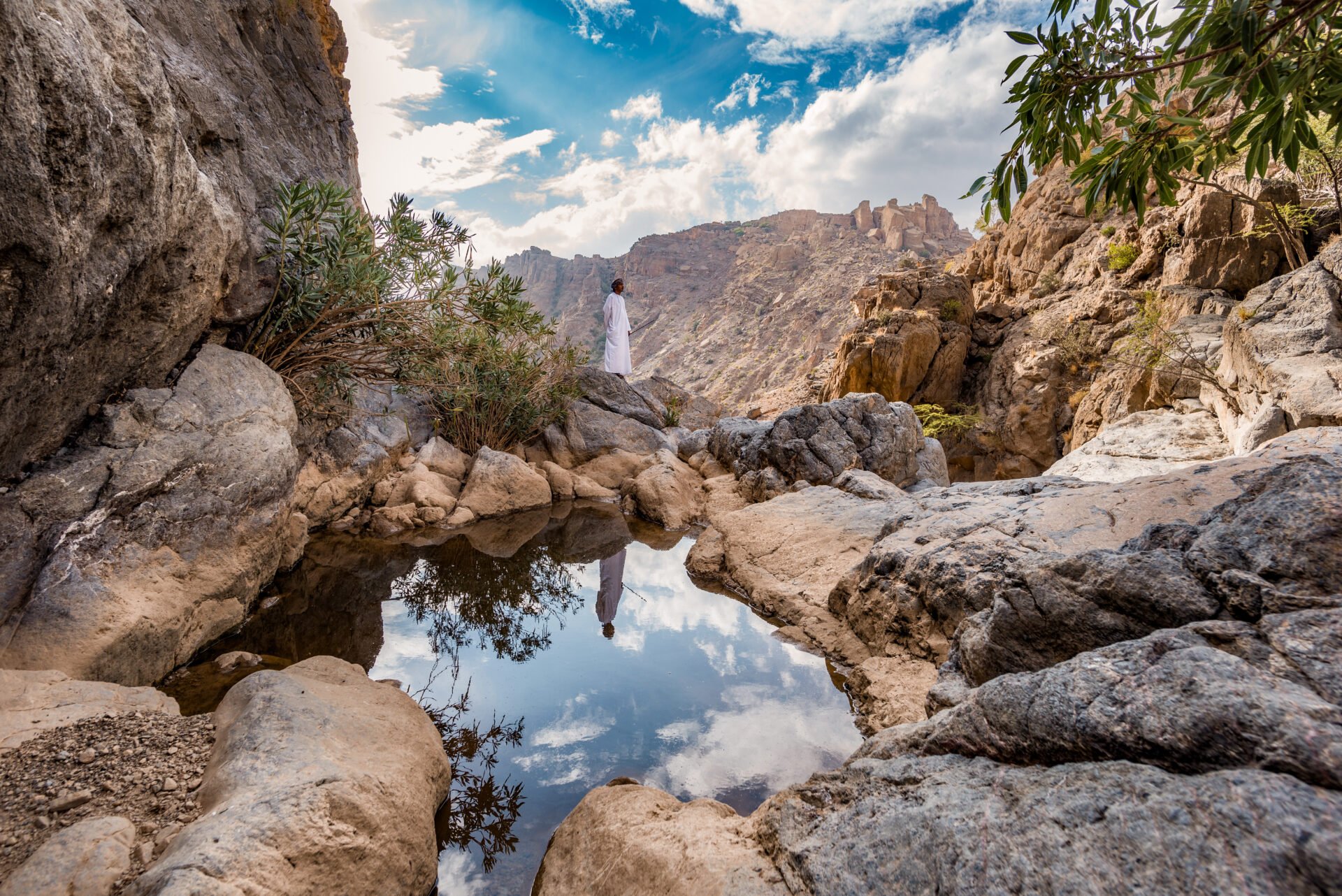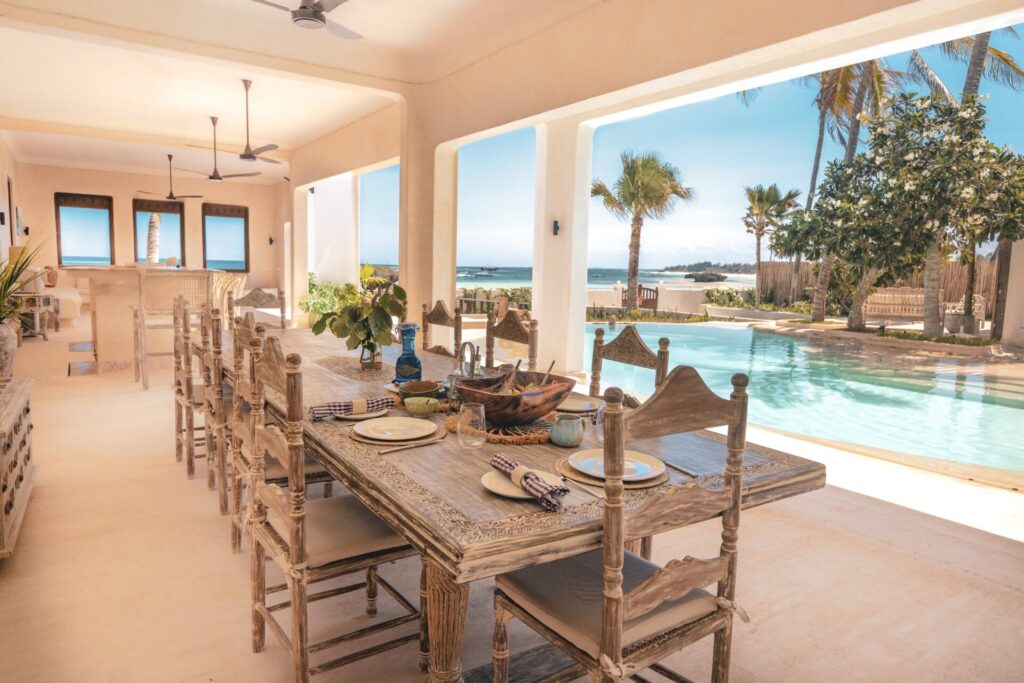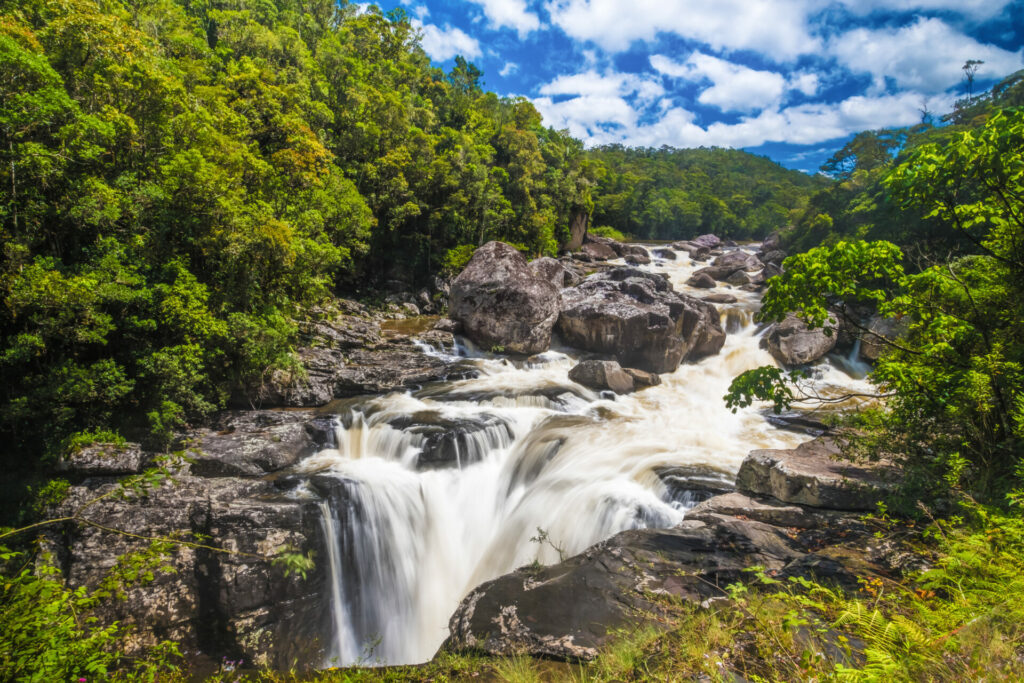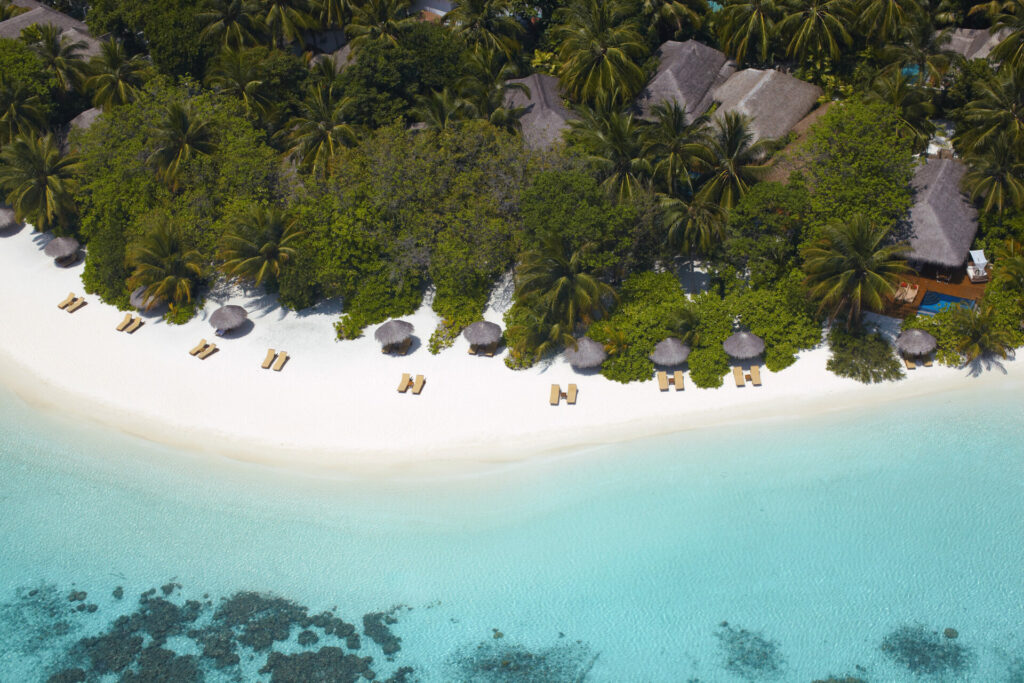‘On your marks, get set, go!’ The call rings through the warm mountain air, and immediately, groups of hotel guests, with woven baskets swinging, scatter in different directions across the Anantara Al Jabal Al Akhdar resort. It’s the start of the annual olive harvest competition, a fun resort tradition celebrating the fruit’s growing season, and I fully intend to win.
The others immediately make a beeline for the olive-clad avenue that stretches from the courtyard start line, an obvious spot given its proximity to the weigh-in baskets. But while they play it safe with distance, my friend and I sprint toward an abundant olive tree I’d spotted earlier on my way to the gym. I mean, what’s the point of competing if you’re not going to try and win?
While I inefficiently pick olives one by one, my mind scurries to find a smarter way. Surely farmers in the days before machinery didn’t do it like this? I think to myself. That’s when I discover our winning strategy, and thirty minutes later, we tip the scales at 17.2 kilos of collected olives – more than double the second-placed team.
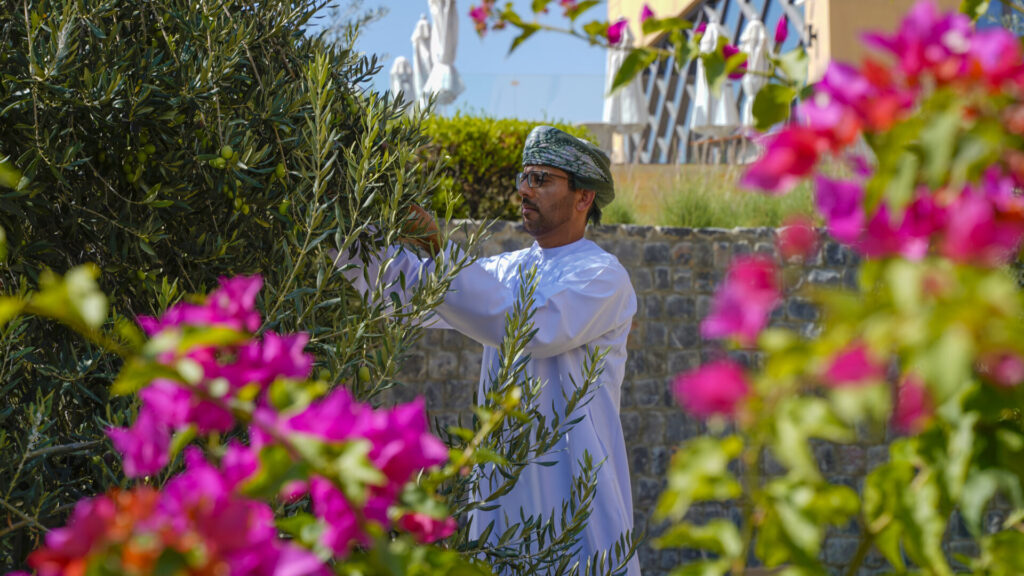
The day before the harvest, I’d arrived at Anantara Al Jabal Al Akhdar to a welcome drink of locally grown pomegranate juice from their recent harvest, a perfect antidote to the furnace I’d left behind in Dubai: a one-hour flight to Muscat, followed by a two-hour climb up winding mountain roads, trading humidity for a ten-degree drop in temperature. From my Canyon View Deluxe Room, the vast sweep of the Al Hajar mountains stretched endlessly ahead.
As much as I would have loved to curl up with a book on the balcony day bed soaking up the views and fresh air, lunch at Bella Vista was calling. With more mesmerising views and produce from the chef’s garden and local farms, it certainly didn’t disappoint. A delicious salad of thinly sliced beetroot, topped with rocket, goat’s cheese, and a sprinkling of caramelised pecans was lifted by a drizzle of Ananatra’s very own olive oil pressed just a few kilometres from the table. Our waitress Fenny was a delight and kept us topped up with crisp white wine at a table looking out over the ochre mountain range.
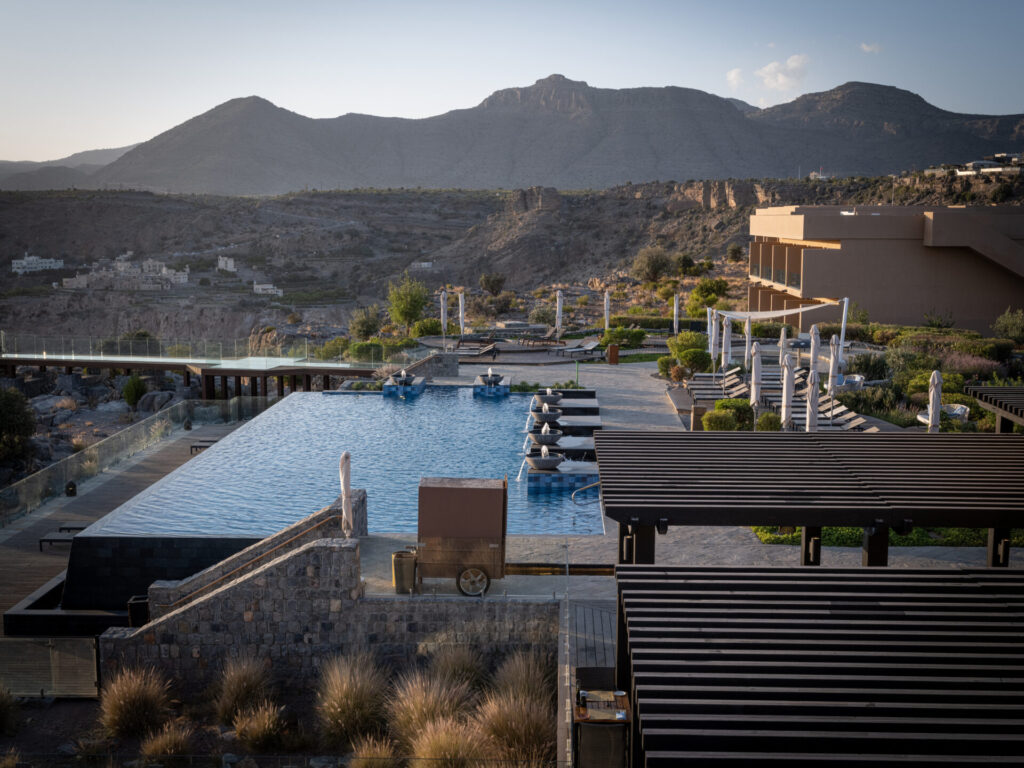
Located right next to the infinity pool that clings to the canyon edge, it’s the perfect post lunch place to relax and wile away the day doing little but listening to the canyon breeze, and taking in the endless landscape. That evening guests were invited to savour olive infused cocktails and canapés on the Al Shurfa terrace, while the sun turned flaming orange and dipped slowly behind the rugged range.
The next day set off to a more energetic start. My friend braved the Via Ferrata, an adventurous cliff-edge adventure that combines hiking and rock climbing, using iron rungs, ladders, bridges, and cables fixed to the rock. Her Omani instructor, a local who scales the cliffs like a mountain goat, has been climbing them since he was a child. Halfway across, he even pointed out the tiny village where he grew up. Having attempted this terrifying hobby once before (elswhere), I opted for the safety of the runnuing machine in the well-equipped gym. Terra firma is more my thing.
After a breakfast that included fresh omlettes, ginger shots, strong coffee, and just-baked breads, the olive harvest competition took place. I’ll spare you the details of my triumphant win…unless you really want a rerun?
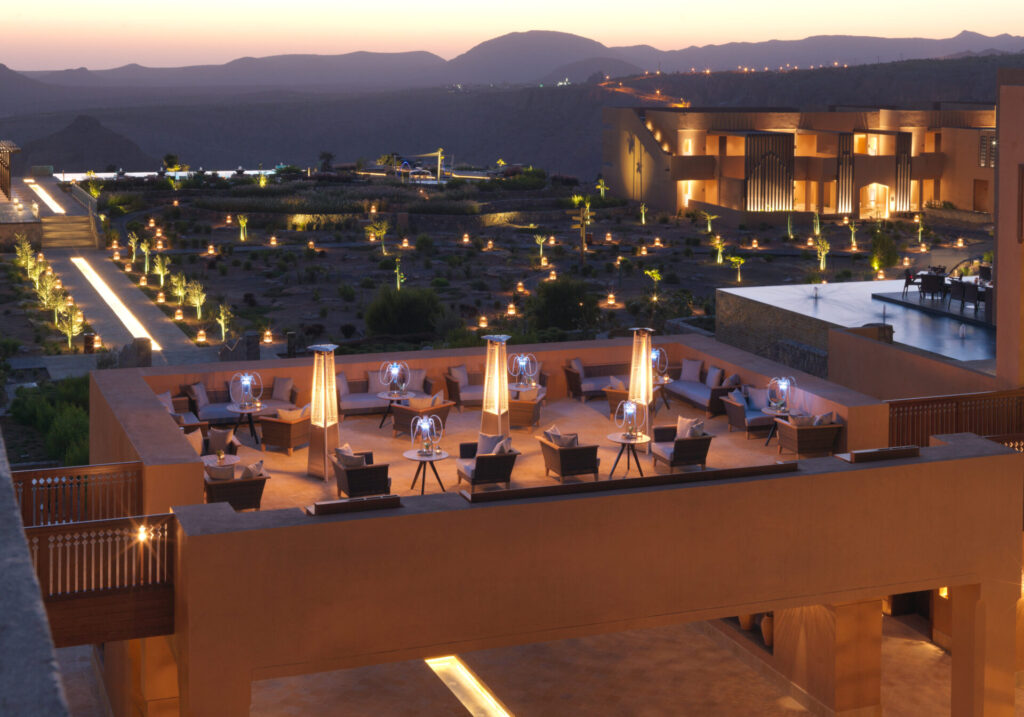
After all that excitement (and a slightly smug sense of success), it was time to trade baskets for aprons. Visiting Executive Chef Ovidiu Gabriel Mușat from Tivoli Portopiccolo Sistiana Wellness Resort & Spa, a Michelin Guide recognised resort, led a ravioli-making class using freshly made pasta, basil and tomatoes picked from the garden that morning, and of course, finished with a drizzle of golden olive oil. Delicious.
An Olive Legacy
To understand the roots of Jabal Akhdar’s olive story, we joined The Olive Heritage Tour led by Dr. Ali Al Furqani, the man behind Oman’s olive oil revolution, and manager of the Royal Groves, no less. He spoke with pride about how these trees, though not native to the country, are thriving in the mountain climes of Al Jabal Al Akhdar.
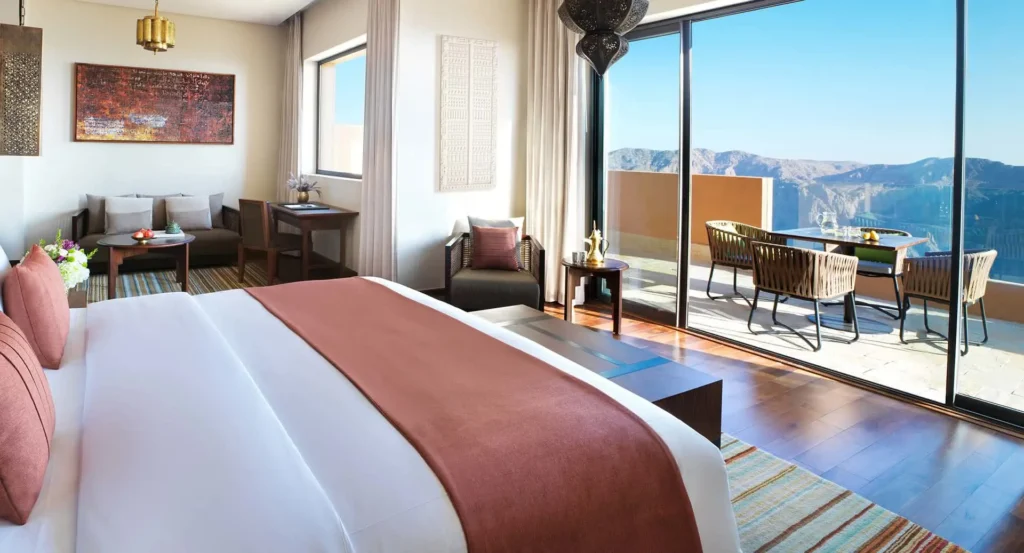
Yet even here, climate change can’t be avoided. We learn that the region may no longer sustain them in fifty years’ time, and that researchers are already testing protective serums and powders to shield the trees from sunburn. It’s part of a wider shift in agriculture, one that’s already seeing crops move north and altitudes rise. All the more reason to appreciate this remarkable fruit, we are reminded with a smile.
Unlike other fruit, olives need no chemicals, just press them, and the oil appears in your hand. ‘It’s a pharmacy in a bottle,’ Dr. Al Furqani says while gently pressing some in his palm. He explains that extra virgin olive oil, rich in polyphenols, can reduce chronic disease, is linked to halving breast cancer rates, and cutting the risk of Alzheimers. ‘Ten millilitres a day,’ he adds, ‘is enough to transform your health.’
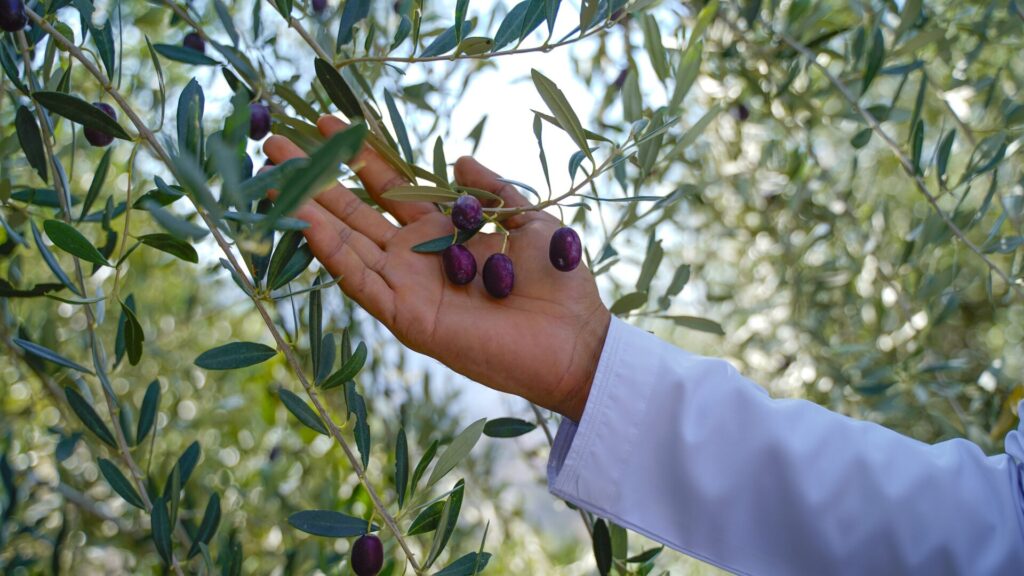
After the tastings we head to the local olive press where we watch farmers arrive from nearby villages, with trucks full of olive crates to be weighed. It felt like stepping back in time to the way agriculture used to be. The air was full of the sound of haggling and laughter, and while we watched, the restaurant owner from next door offered us all a sweet warm tea. A small gesture that speaks volumes about Omani generosity. Before heading back to the resort, we buy a bottle of the fresh oil there and then, worth a million times the anonymous ones that line supermarket shelves.
That evening, under a canopy of mountain stars, we sat down to an outdoor Spanish garden dinner at Al Qalaa, created by visiting chef Aristondo from NH Collection San Sebastián Aránzazu in his hometown of San Sebastián. Channelling the bold flavours of the Basque Country, he brought a touch of northern Spain to the mountains of Oman. I enjoyed a vegetarian paella followed by a San Sebastián cake, naturally.
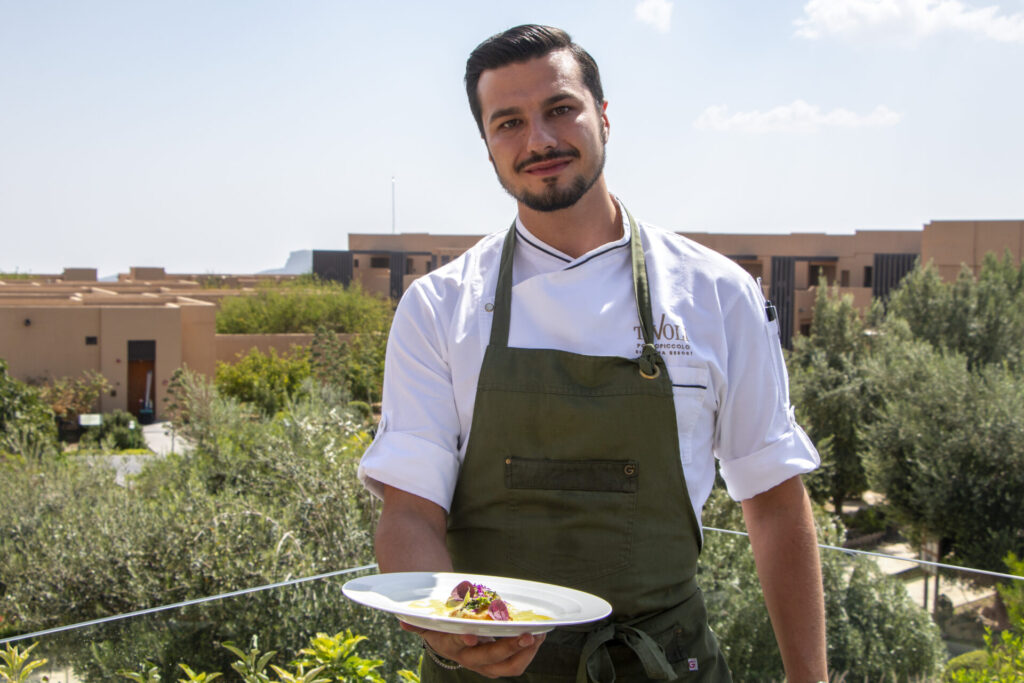
The next morning over breakfast, we heard Olive Tales at Breakfast led by olive historian Giorgio Robles, who shared stories about Sicily as an olive growing region for centuries. He echoed the sentiment shared the day before about changing climates affecting traditional harvests. Coming from a long lineage of olive oil producers, Giorgio shared that he is now trialling dragon fruit to meet the warmer temperatures of Italy.
Back in my room, I tucked my bottle of olive oil safely into my bag, already imagining how I would drizzle it over salads back home. I closed the door behind me with a new appreciation of the humble olive, an unexpected sun tan, and the satisfaction of being an olive-picking champion.
As for our winning strategy? I’m not telling… because we fully intend to defend the title next year.
Getting There
Anantara Al Jabal Al Akhdar sits high in Oman’s Al Hajar Mountains, around a two-hour drive from Muscat or about five and a half hours from Dubai. Only 4×4 vehicles are permitted beyond the mountain checkpoint, but the resort can arrange transfers for guests without one.
Canyon View Rooms start from around AED 1,800 per night, including breakfast, depending on the season.
Gor more information visit anantara.com

